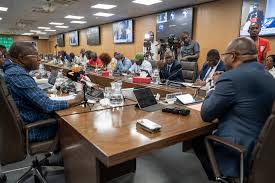Africa is moving into a new chapter that could define its future not by problems, but by opportunities. With a fast-growing population expected to reach 2.5 billion by 2050, the continent stands as the youngest in the world, rich in natural resources, innovation, and human capacity. But despite these strengths, Africa’s journey toward becoming a major global economic force has been slow and uneven.
This was the main message from the 2025 Annual Meetings of the African Development Bank (AfDB) Group held in Abidjan, Côte d’Ivoire. The key focus was on how to unlock Africa’s full potential by ensuring that capital—both financial and human—is used more effectively to support sustainable development.
The meetings were held under the theme “Making Africa’s Capital Work Better for Africa’s Development”. They brought together African heads of state, finance ministers, private sector leaders, development partners, and policy experts. At the heart of the discussions was the African Union’s Agenda 2063, a long-term plan that aims to drive inclusive and sustainable growth across the continent.
Agenda 2063 includes targets like regional integration, industrial growth, technological advancement, and improved governance. However, many African leaders agreed that achieving these goals will require better ways to deploy capital and fix some deep-rooted issues in the system.
Speaking at one of the sessions, Koffi N’Guessan, Côte d’Ivoire’s Minister of Vocational Training and Apprenticeships, said Africa has made some progress in the last 10 years, especially in areas like gender equality and regional cooperation. But he warned that development across the continent is still moving too slowly to meet the needs of its people.
He pointed out that poor infrastructure, disjointed financial markets, and lack of jobs for young people remain major obstacles. He added that without urgent action, these problems will continue to limit Africa’s ability to grow and compete globally.
The minister also focused on education and skills. He said about 22.5 percent of African youth between 15 and 24 years old are unemployed, and many of them are not in any form of education or training. In addition, around 250 million young people and children in low-income countries are out of school. This, he said, shows that African education systems are not meeting the needs of the job market.
“Youth can become a liability if robust training policies are not implemented – from nursery school through to university,” he said. He urged African governments to prioritise technical and vocational training to make the most of the continent’s young population.
Another key topic at the meetings was how to value Africa’s natural resources better. Hervé Lohouès, Division Manager in the Country Economics Department at AfDB, said natural wealth should be factored into the calculation of national GDPs. He gave the example of the Central African Republic, whose GDP could rise by 300 percent if its natural assets were properly included.
Lohouès said Africa must go beyond just recognising the value of its land and resources. He called for mandatory national development plans that encourage transformation, with clear accountability and support for building social infrastructure like education and healthcare.
Jide Okeke, Regional Program Coordinator for Africa at the United Nations Development Programme (UNDP), and Dagmawit Moges Bekele, former Eritrean Minister of Transport and now Director of the Peace Fund at the African Union Commission, both said the continent must use all its resources—financial, human, natural, and digital—to drive inclusive growth. They stressed that this is key to meeting the goals in the second decade of Agenda 2063.
Many experts at the event said private investment will play a big role in Africa’s growth. To attract that investment, African countries need to adopt friendly policies that encourage innovation, support cross-border trade, and boost entrepreneurship. Aligning development plans with big initiatives like the African Continental Free Trade Area (AfCFTA) and promoting green industrialisation were also mentioned as necessary steps.
The AfDB’s annual meetings served as a reminder that while Africa has the talent and tools for progress, it needs urgent and strategic action to convert its potential into real development. With stronger policies, better use of capital, and a focus on young people, Africa could position itself as a future global power alongside countries like India and China.
